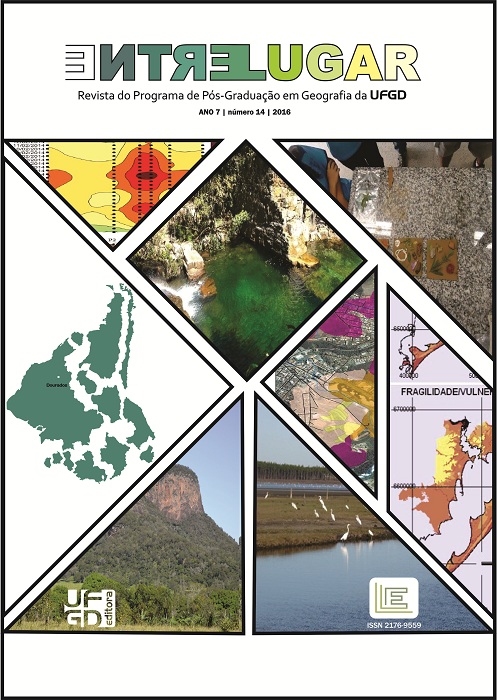Tourism and sustainability: an analysis of current and future problems of tourist systems and enclaves in natural environments
Keywords:
Alternative tourism. Ecotourism. Life cycle. Environmental impacts. Social impacts.Abstract
This study compared cases of tourism systems and enclaves and their situations of development and sustainability. Their results contributed to establish the possible trajectories of the tourism systems located in Mato Grosso do Sul state, Serra da Bodoquena and the Pantanal. The cases analyzed are those of Mexico and Costa Rica, with different stages of their life cycle. The greatest emphasis was on the systems of Mexico and Costa Rica for their similarities with the cases of Brazil. The working method was based on secondary bases and was divided into a vision of the tourist potentialities, their management, their problems and their perspectives for the future. At the end, common patterns of development and their effects on sustainability were discussed.
Downloads
References
ANDREU, Marta G. N. Ecoturismo, conservació de la natura i desenvolupament local: els casos de Méxie, América Central I les Grans Antilles. Tesi Doctoral, Universitat Rovira I Virgili, 2003.
ARCHER, Brian; COOPER, Chris. Os impactos positivos e negativos do turismo. In: THEOBALD, Willian F. (org.) turismo Global. Traduzido por A. M. Capovilla, M.C.G. Cupertino e J. R. B. Penteado. 2a. ed. São Paulo: Editora SENAC, 2002.
BENI, Mario Carlos. Análise Estrutural do turismo. 2 Ed. São Paulo: SENAC, 1998.
BERLIN DECLARATION. Berlin Declaration: Biological Diversity and Sustainable Tourism. (1997) Disponível em <https://www.bfn.de/fileadmin/MDB/documents/ 031402_berlinen.pdf >, baixado em 10 de maio de 2018.
BRENNER, Ludger; AGUILAR, Adrián Guillermo. Luxury Tourism and Regional Economic Development in México. The Professional Geographer, 54(4), pages 500-520, Oxford-UK: Blakwell Publishing, 2002.
BROHMAN, John. New directions in tourism for third world development. Annals of Tourism Research, Great Britain, Elsevier Science, Vol. 23, No. I, pp. 48-70, 1996.
CARPENTER, Bruce Rogers.Puerto Rico’s Planned Development of Tourism. Ph.D. Thesis. Political Sicience, International law and relations. Michigan: The American University, 1964.
EAGLES, Paul F. J.; MCCOL, Stephen F.; HAYNES, Christopher D. Sustainable Tourism in Protected Areas: Guidelines for Planning and Management. Word Commission on Protected Areas – WCPA. Best Practice Guidelines Series Nº.8. IUCN – International Union for Conservation and Nature: Cambrige –UK, 2002.
FENNEL, David. Ecoturismo: uma introdução. São Paulo: Contexto, 2002.
FUENTES, Ana Garcia de. Cancun Turismo y Subdesarrollo Regional. México: Universidad Autônoma de México, Série Cuadernos, 1979.
GUIN/FERL. Costa Rica/turismo. In: Enciclopédia Mirador Internacional. São Paulo-Rio de Janeiro, 1979. Vol.6.
HALL, Colin Michael. Planejamento turístico: políticas, processos e relacionamentos. São Paulo: Contexto, 2001.
HAWKINS Donald E.; KAHN, Maryam M. Oportunidades para o turismo Ecológico nos Países em Desenvolvimento. In: THEOBALD, Willian F. Turismo Global. Traduzido por A. M. Capovilla, M.C.G. Cupertino e J.R.B. Penteado. 2ª. ed. São Paulo: SENAC, 2002.
INTERNATIONAL ECOTOURISM SOCIETY. Ecotourism Statiscal Fact Sheet (2000). Disponível em: < http:// www.ecotourism.org >, acesso em março de 2003.
JUDD Dennis R. El turismo urbano y la geografía de la ciudad. Revista eure, Santiago de Chile, Vol. XXIX, Nº 87, septiembre 2003, pp. 51-62.
LASCURÁIN, Hector-Ceballos. Estratégia Nacional de Ecoturismo para México. Disponível em , acesso em 04/12/1999.
McMINN, Stuart; CATER, Erlet. Tourism typology: observations from Belize. Annals of Tourism Research, Great Britain, Vol. 25, Nº. 3, 1998, pp. 675–699.
MÉXICO, Secretaria de Turismo. Boletín hechos y tendencias del turismo. Nº 11, Septiembre de 2002, primera edición 16 pp. Disponível em: <http://www.sectur.gob.mx>, acesso em: Março 2004.
MONTEROS, Roberto Lopez-Espinosa. Evaluating ecotourism in natural protected areas of ´ La Paz Bay, Baja California Sur, Mexico: ecotourism or nature-based tourism? Netherlands: Biodiversity and Conservation 11: 2002, pp.1539–1550.
PETROCCHI, Mario. Gestão de Pólos Turísticos. São Paulo: Futura, 2001.
RIVERA-ARRIAGA, Evelia; VILLALOBOS, Guillermo. The Coast of Mexico: approaches for its management. Ocean & Coastal Management (44)729–756. 2001.
ROGOZINSKI, Jacques. The Impact of Tourism in the Economy. The Mexican Case. PHD Thesis, University of Colorado, 1980.
SCHLÜTER, Regina. Desenvolvimento do Turismo as Perspectivas na América Latina. In: THEOBALD, Willian F.(org.). Turismo Global. Traduzido por A. M. Capovilla, M.C.G. Cupertino e J.R.B. Penteado. 2a. ed.. São Paulo: SENAC, 2002.
SEGURA Gustavo; INMAN, Crist. Inman. Turismo en Costa Rica: La Visión a Largo Plazo, Noviembre, 1998. disponível em: <http://www.uwstout.edu >, acesso em: Abril 2004
TORRES, Rebecca. Linkages between tourism and agriculture in Mexico. Annals of Tourism Research, Great Britain: Vol. 30, Nº 3, 2003, pp. 546–566.
ULATE, Allen Cordero. La vertiente social de los centros históricos del turismo. Los casos de Playas de Coco, Limón y Puntarenas (Costa Rica). In MULLOR, Ernest Cañada y BLÁZQUEZ, Macia. Turismo Placebo: nueva colonización turística Del Mediterráneo a Mesoamérica y El Caribe. Managua: Edisa, 2011.
WEARING, John & NEIL, Stephen. Ecoturismo: Impactos, Potencialidade e Possibilidades. Barueri-SP: Editora Manole, 2001.
WEAVER, D. Bruce. Ecotourism as Mass Tourism: Contradiction or Reality?What’s the difference between ecotourism and mass tourism? Not much, perhaps. Hotel And Restaurant Administration, Cornell University: Tourism –Cornell: Quarterly, Abril. 2001.
WTO - WORD TOURISM ORGANIZATION . Mexico: Country-specific: Arrivals of non-resident tourists at national borders, by country of residence 2012 - 2016 (09.2017). Disponível em <https://www.e-unwto.org> acesso em maio de 2018.
Downloads
Published
How to Cite
Issue
Section
License
Autores que publicam nesta revista concordam com os seguintes termos:
- Autores mantém os direitos autorais e concedem à revista o direito de primeira publicação, com o trabalho simultaneamente licenciado sob a Creative Commons Atribuição-NãoComercial-CompartilhaIgual 3.0 Brasil que permitindo o compartilhamento do trabalho com reconhecimento da autoria do trabalho e publicação inicial nesta revista.
- Autores têm autorização para assumir contratos adicionais separadamente, para distribuição não-exclusiva da versão do trabalho publicada nesta revista (ex.: publicar em repositório institucional ou como capítulo de livro), com reconhecimento de autoria e publicação inicial nesta revista.
- Autores têm permissão e são estimulados a publicar e distribuir seu trabalho online (ex.: em repositórios institucionais ou na sua página pessoal) a qualquer ponto antes ou durante o processo editorial, já que isso pode gerar alterações produtivas, bem como aumentar o impacto e a citação do trabalho publicado (Veja O Efeito do Acesso Livre).




